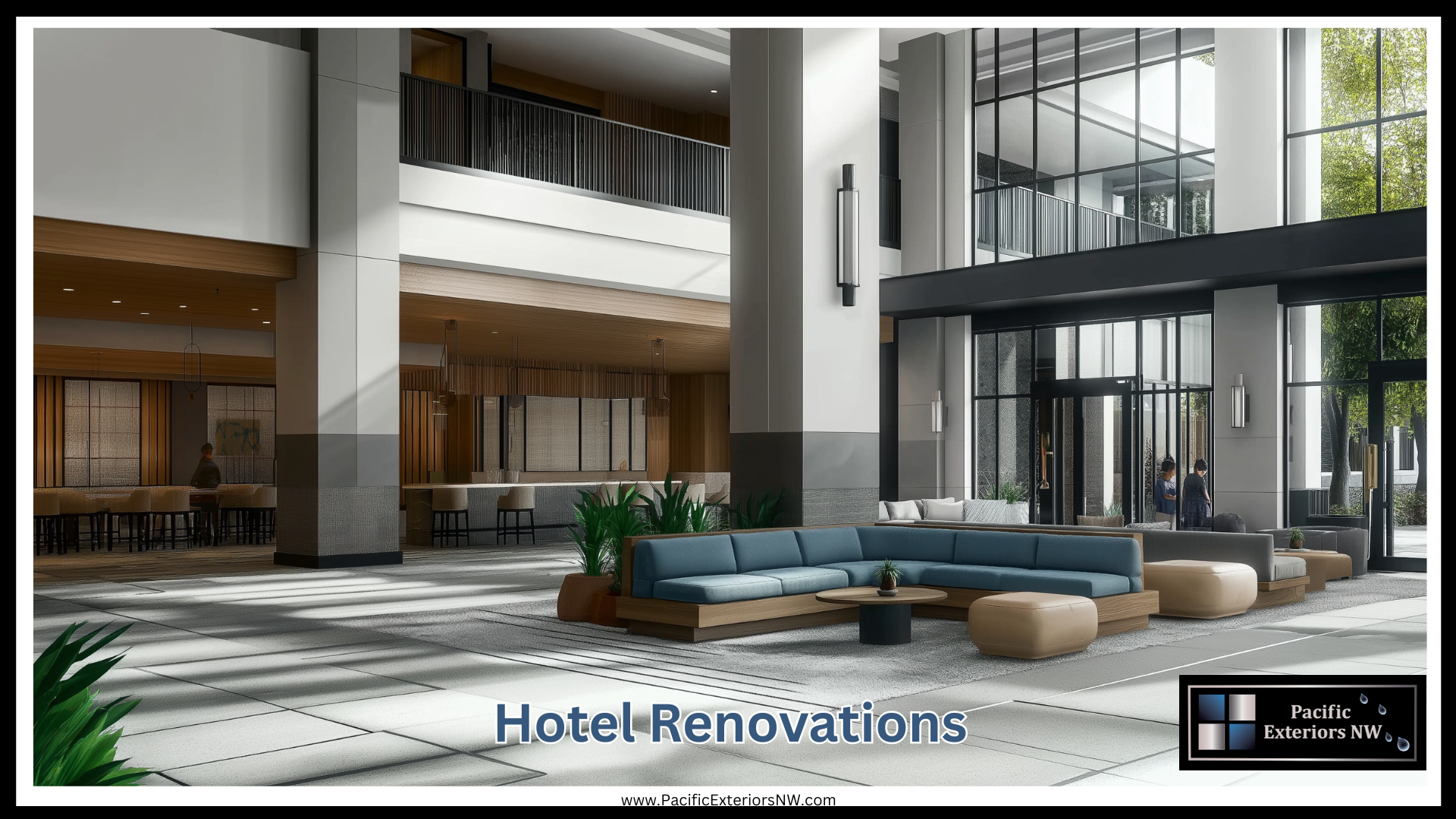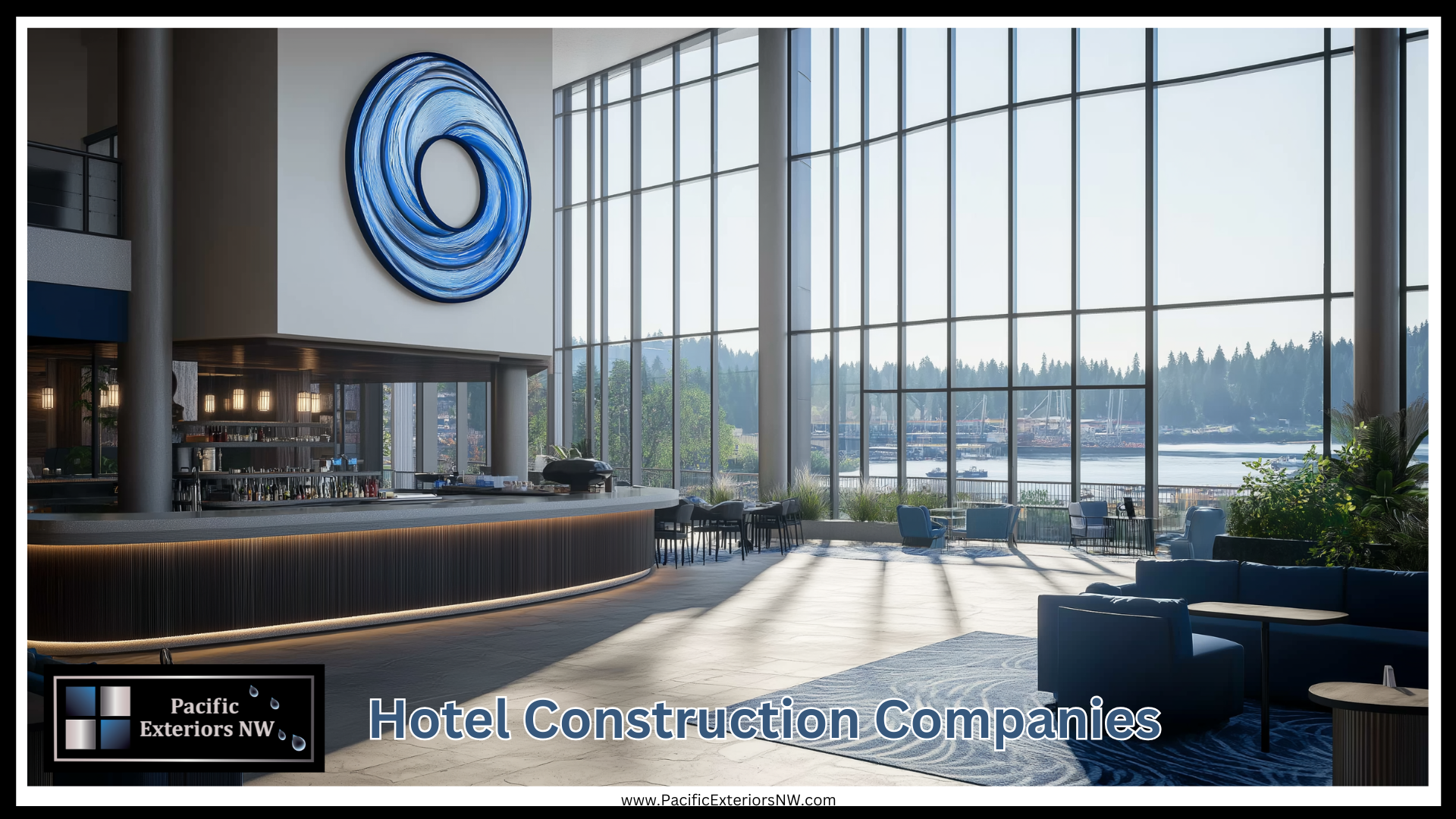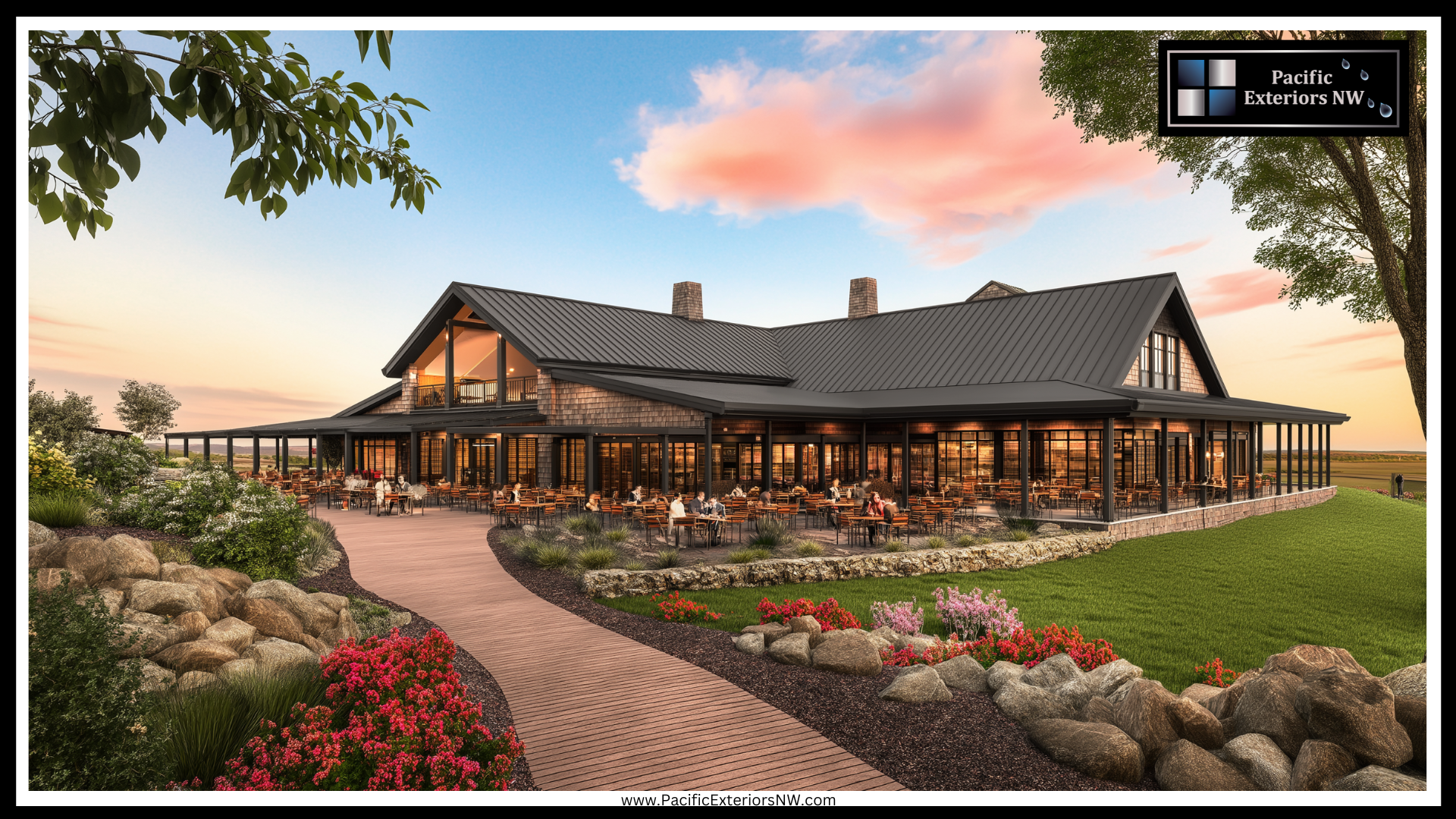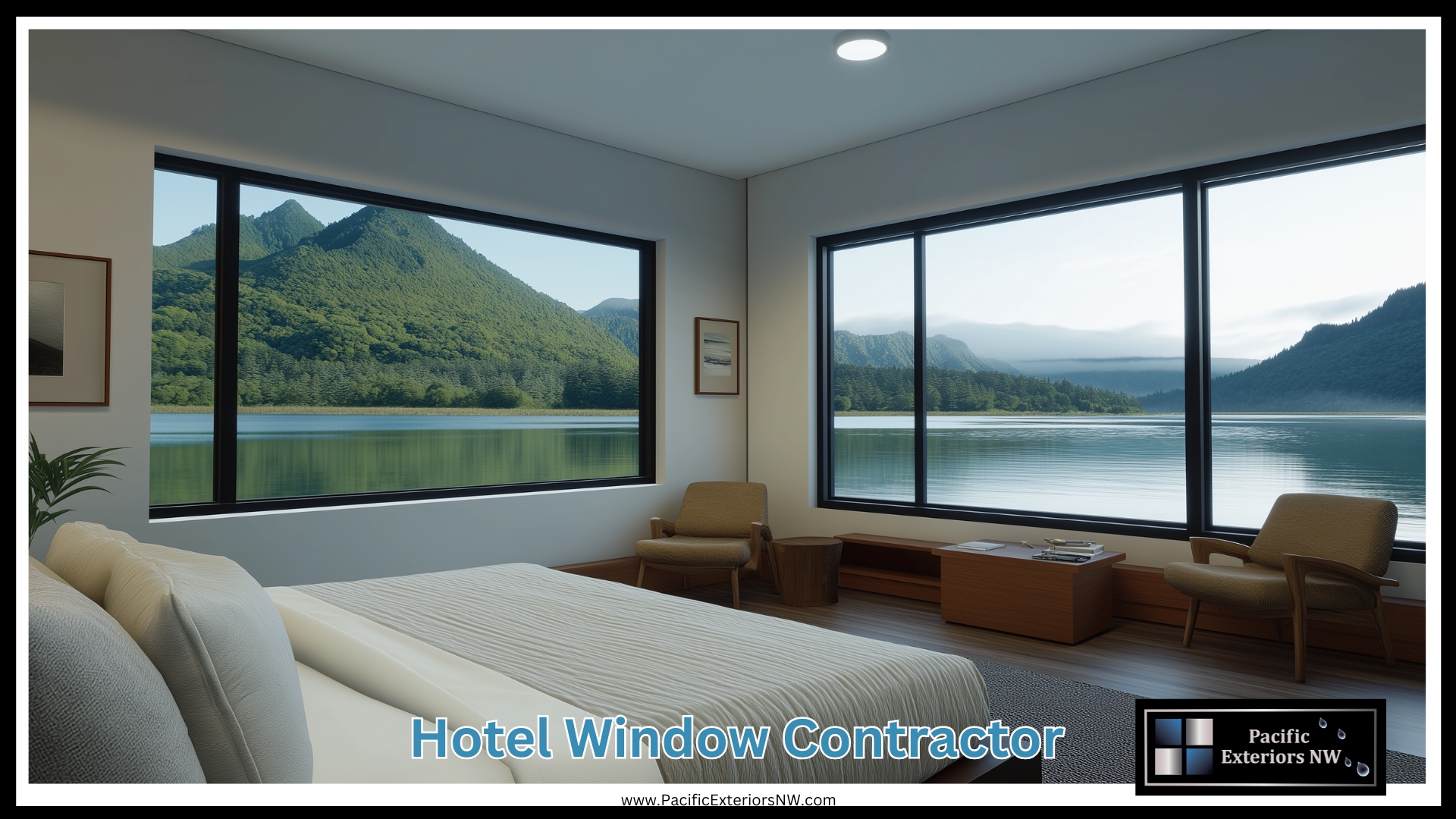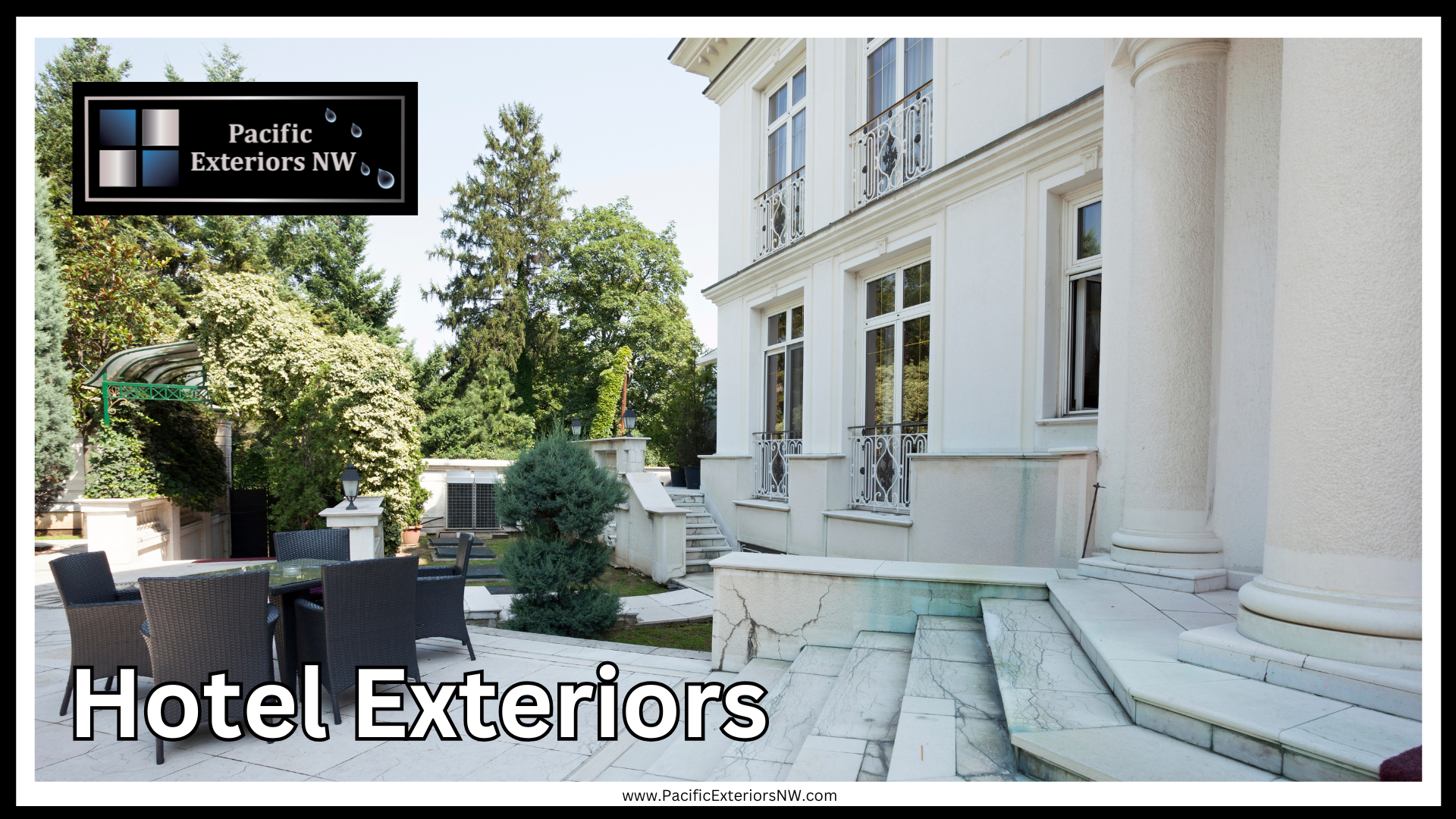Hotel Renovation Challenges
Renovating hotels in the Pacific Northwest presents unique challenges and opportunities. For companies like Pacific Exteriors NW, which specialize in modernizing hotels, the focus is on critical updates that balance contemporary needs with timeless charm. This article will delve into how siding, window enhancements, and building envelope upgrades can transform these properties.
Understanding the Pacific Northwest Climate
The climate of the Pacific Northwest can be particularly challenging for buildings. Moisture and variable temperatures test the endurance of materials and architectural integrity. For hotels, this means that the selection of materials and restoration methods must be strategically chosen to withstand these conditions. Pacific Exteriors NW excels in selecting materials that are both durable and aesthetically pleasing, ensuring longevity and appeal.
The Importance of Siding in Hotel Renovations
The exterior siding of a hotel is not just its aesthetic cloak but its first line of defense against the elements. In the Pacific Northwest, where the climate can pose significant challenges, choosing the right siding material and style is critical for both preservation and performance. Pacific Exteriors NW specializes in siding solutions that meet these unique demands, providing long-lasting protection and enhancing the building’s visual appeal.
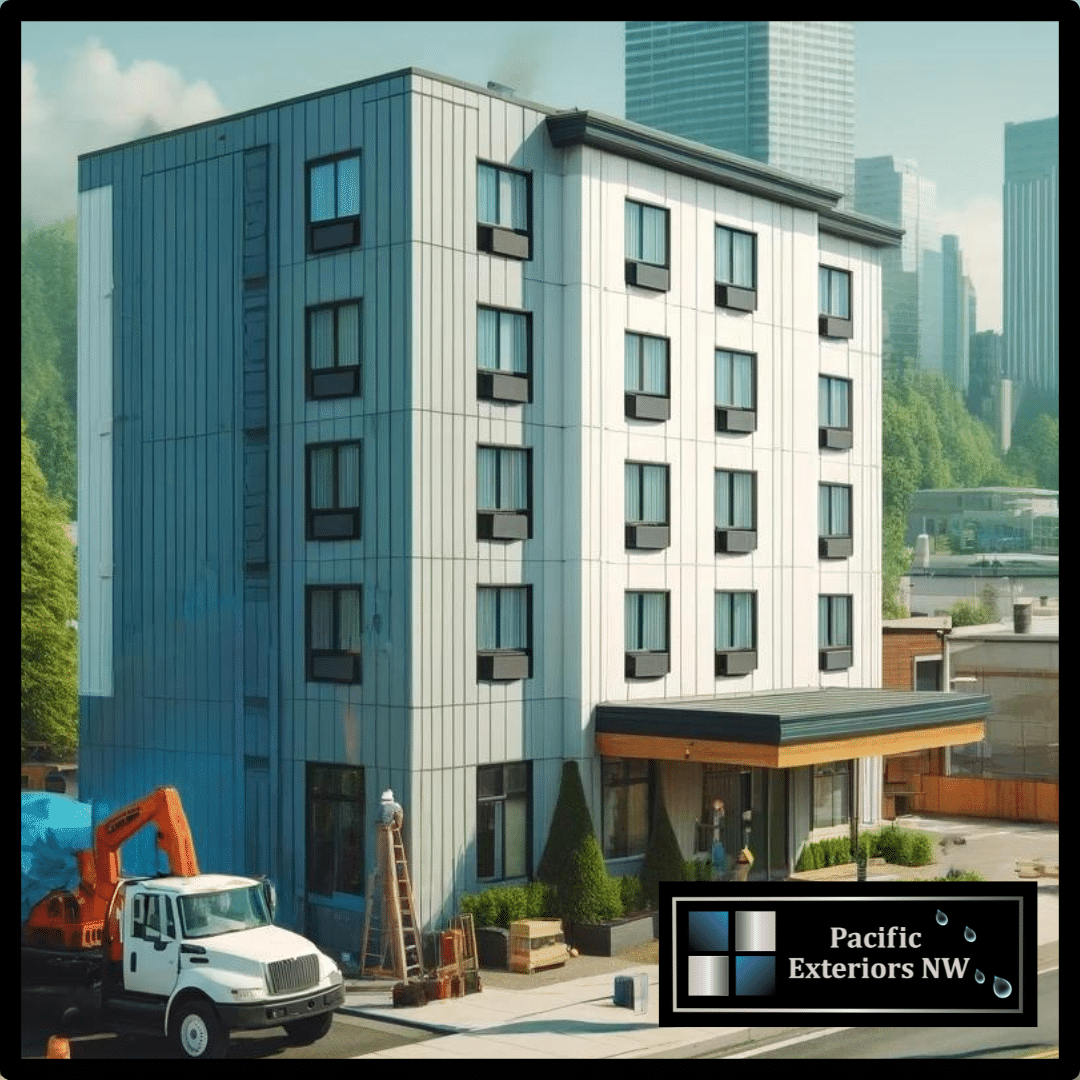
Choice of Materials
When selecting siding materials for hotel restoration, several factors must be considered to ensure durability, maintenance ease, and aesthetic value:
- Fiber Cement Siding: Highly resistant to rot, fire, and termites, fiber cement siding withstands the damp, rainy weather typical of the Pacific Northwest. Its versatility allows it to mimic other materials like wood and stucco, offering a range of styles without compromising on protection.
- Wood Siding: Offers a classic, rich look that is particularly valuable for historic hotels looking to maintain their original charm. While it requires more maintenance than other materials, its natural beauty is unmatched. Pacific Exteriors NW uses expert sealing and treatment products to enhance its longevity.
- Metal Siding: Ideal for a modern look or industrial-themed properties, metal siding is durable, fire-resistant, and can handle the harsh winds and heavy rains typical of coastal storms in the region.
Color and Style
The color and style of siding chosen can dramatically affect the perception and curb appeal of a hotel. Pacific Exteriors NW understands the importance of these aesthetic decisions:
- Color Matching: For older hotels, matching the original color palette is essential for maintaining the look of the hotel. We use advanced color-matching technologies to ensure new siding harmonizes with original hues.
- Architectural Accuracy: Siding should complement the hotel’s architectural style. Whether restoring a Victorian beauty or a mid-century modern piece, the siding must echo the building’s era and character.
- Texture and Shadow Lines: The texture of the siding material and the shadow lines it creates can add depth and interest to the hotel’s exterior. These subtle nuances contribute to the overall ambiance and guest experience, even before they step inside.
Through a meticulous selection of materials and attention to detail in color and style, Pacific Exteriors NW ensures that hotel restoration projects not only protect and preserve the building but also enhance its historical and aesthetic value. This strategic approach to siding results in a functional yet visually appealing exterior that can stand the test of time in the Pacific Northwest’s challenging climate.
Window Considerations for Energy Efficiency
Upgrading the windows in a hotel is crucial for enhancing the building’s aesthetics and improving its energy efficiency, guest comfort, and overall operational costs. Pacific Exteriors NW understands that the right windows can make a significant difference in the Pacific Northwest, where weather conditions can fluctuate dramatically. Here are detailed considerations when choosing windows for hotel restoration projects:
Types of Windows
Different types of windows can offer various benefits for hotels, depending on their specific needs and the architectural style of the building:
- Double-Glazed Windows: These windows have two layers of glass with a space between them to reduce heat transfer and noise, making them ideal for hotels in noisy, urban environments or cold weather regions like the Pacific Northwest.
- Triple-Glazed Windows: For even greater insulation, triple-glazed windows provide an additional layer of glass, which can be essential in areas with extreme weather conditions. They also offer superior energy conservation and noise reduction.
- Tilt and Turn Windows: These offer versatile ventilation options and are easy to clean, making them suitable for hotel settings where functionality and guest comfort are priorities.
Energy Efficiency
Choosing energy-efficient windows is paramount for reducing heating and cooling costs:
- Low-E Coatings: Windows treated with Low-E (low emissivity) coatings reflect infrared light, keeping heat inside during the winter and outside during the summer. Pacific Exteriors NW recommends these for their ability to lower energy bills and enhance the comfort of hotel guests.
- Gas Fills: Argon or krypton gas can be used between the panes of glass in insulated glazing to reduce heat transfer and improve thermal performance.
Custom Frames
The frame material and design play a significant role in the window’s performance and its integration into the building’s facade:
- Wood Frames: While they offer a classic and warm aesthetic, particularly suitable for historic hotels, wood frames require regular maintenance to prevent weathering and decay.
- Vinyl Frames: These provide excellent moisture resistance and are low maintenance, making them a cost-effective option for hotel chains.
- Aluminum Frames: Durable and strong, aluminum frames work well in modern hotel designs and offer slim profiles for larger panes of glass, maximizing natural light.
- Composite Frames: Combining the benefits of wood and vinyl, composite frames offer durability and aesthetic flexibility, particularly useful for customized restoration needs.
Historical Accuracy
For historic hotel renovations, maintaining the integrity of the original design while incorporating modern technology is essential:
- Custom Millwork: Pacific Exteriors NW often employs custom millwork to replicate historic window designs, ensuring that new windows match the original as closely as possible without sacrificing energy efficiency.
- Preservation-Compliant Materials: Ensuring compliance with local historic preservation standards is critical. Using modern materials that mimic historical ones can help navigate the regulatory landscape while preserving the building’s heritage.
By integrating these advanced window solutions, Pacific Exteriors NW enhances hotel environmental control, significantly boosts energy efficiency, and respects architectural aesthetics. This thoughtful approach to window selection and installation ensures that the hotel looks inviting and offers a comfortable, sustainable environment for guests.
Enhancing the Building Envelope
A robust building envelope is crucial for protecting a hotel from the harsh climate of the Pacific Northwest, ensuring the longevity and energy efficiency of the structure. Renovating this critical component involves several key practices that Pacific Exteriors NW expertly manages to enhance both the function and aesthetics of hotels. Here’s a detailed breakdown of how building envelopes are enhanced during hotel renovations:
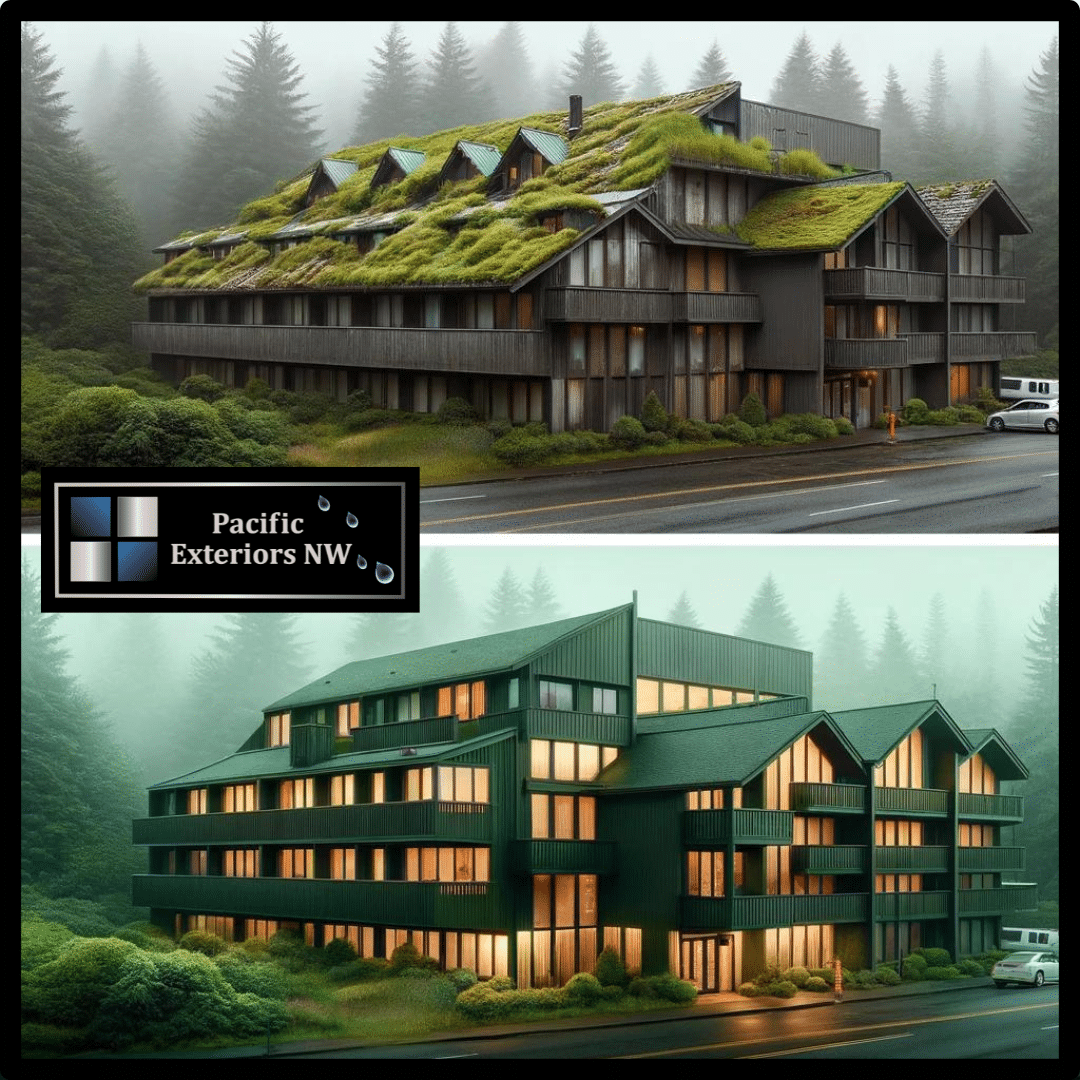
Understanding Building Envelope Functionality
The building envelope includes all the elements of the outer shell that maintains a dry, heated, or cooled indoor environment and facilitates its climate control. Enhancing the building envelope typically involves upgrading the roof, walls, windows, and doors to improve thermal performance and moisture management.
Key Components of the Envelope
- Roofing: Upgrading roofing materials to ones that offer better insulation and are more resistant to moisture and mold. Options like green roofing or highly reflective materials can also be used to enhance energy efficiency.
- Wall Systems: Installing advanced wall systems that offer improved thermal insulation. Materials such as insulated metal panels or upgraded siding materials like fiber cement or vinyl can dramatically improve energy conservation.
- Windows and Doors: Replacing old windows and doors with high-performance units featuring double or triple-pane glass and energy-efficient frames. This not only reduces energy loss but also helps in controlling condensation and enhancing soundproofing, which is vital for guest comfort.
Advanced Techniques and Materials
- Air and Vapor Barriers: Proper installation of air and vapor barriers is essential to control moisture and air leakage, which are common problems in the humid climate of the Pacific Northwest. These barriers help maintain the integrity of other building materials and improve the overall thermal efficiency of the building.
- Insulation: Upgrading insulation is one of the most effective ways to enhance a building’s envelope. High-quality options like spray foam, rigid foam boards, or fiberglass batts can be used depending on the specific needs of the building, such as acoustic insulation or fire resistance.
- Sealant and Flashing: Applying high-quality sealants and proper flashing at joints, openings, and critical junctures ensures that no water infiltration occurs, which can lead to structural damage or mold growth.
Benefits of a Strong Building Envelope
A well-designed and robust building envelope can bring numerous benefits:
- Energy Savings: Improved insulation and air sealing minimize the energy required for heating and cooling, reducing utility costs significantly.
- Comfort and Air Quality: Enhances indoor air quality and comfort by regulating temperature and humidity, making the hotel more appealing to guests.
- Durability and Reduced Maintenance: Protects structural integrity and reduces the need for frequent repairs and maintenance, thereby extending the life of the property.
Pacific Exteriors NW takes a comprehensive approach to building envelope enhancements during hotel renovations, ensuring that every aspect is optimized for performance and durability. This strategic focus not only preserves the value of the property but also enhances the guest experience, which is crucial for the hotel’s reputation and operational success.



